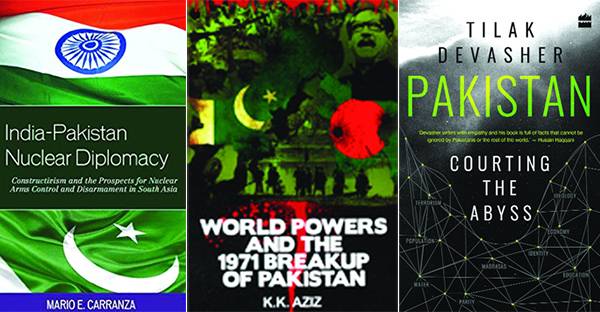
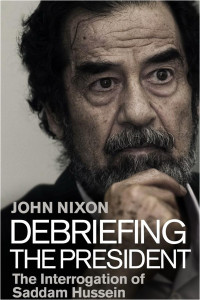
Debriefing the President: The Interrogation of Saddam Hussein
By John Nixon
Bantam (paperback), 2016
Rs1,195
Debriefing the President: The Interrogation of Saddam Hussein is a riveting, revealing and newsmaking account of the CIA’s interrogation of Saddam, written by the CIA agent who conducted the questioning. In December 2003, after one of the largest manhunt in history, US military forces captured Iraqi president Saddam Hussein near his hometown of Tikrit. At the time, John Nixon was a senior CIA leadership analyst who had spent years studying Hussein. “Called upon to make the official ID, Nixon looked for telltale scars and tribal tattoos and asked Hussein a list of questions only he could answer,” according to a review by Penguin Random House. “The man was indeed Saddam Hussein, but as Nixon learned in the ensuing weeks, both he and America had greatly misunderstood just who Saddam Hussein really was.”
Debriefing the President is an astounding, candid portrait of one of our era’s most notorious strongmen. Nixon, the first man to conduct a prolonged interrogation of Hussein after his capture, offers expert insight into the history and mind of America’s most enigmatic enemy. After years of parsing Hussein’s leadership from afar, Nixon faithfully recounts his debriefing sessions and subsequently strips away the mythology surrounding an equally brutal and complex man. His account is not an apology, but a sobering examination of how preconceived ideas led Washington policymakers—and the Bush White House—astray. Unflinching and unprecedented, Debriefing the President exposes a fundamental misreading of one of the modern world’s most central figures and presents a new narrative that boldly counters the received account.
About the author
John Nixon was a senior leadership analyst with the CIA from 1998 to 2011. He did several tours in Iraq. Nixon regularly wrote for, and briefed, the most senior levels of the US government. Since leaving the Agency in 2011, Nixon has worked as an international risk consultant in Abu Dhabi, UAE.
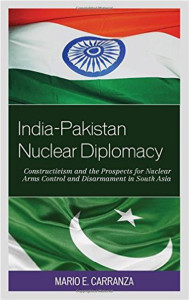
India-Pakistan Nuclear Diplomacy: Constructivism and the Prospects for Nuclear Arms Control and Disarmament in South Asia (Studies on Weapons of Mass Destruction Series)
Mario E. Carranza
Rowman & Littlefield Publishers (2016)
Hardback
Rs3,395
According to a review by Leonard S. Spector, deputy director, James Martin Center for Nonproliferation Studies, Middlebury Institute of International Studies, this is a thoughtful and well-wrought examination of the India-Pakistan nuclear relationship that offers hope that New Delhi and Islamabad may, in time, retreat from their nuclear stand-off. Through the robust application of the international relations theory, with an emphasis on constructivism, Carranza shows that the two states’ nuclear confrontation is not an inescapable dilemma, but one that can become more tractable over time, in particular, because of the influence of global norms against nuclear armaments. Students of IR theory will find Carranza’s in-depth application of this scholarly tool to a specific, high-profile case to be of particular value.
Aaron Karp, Senior Lecturer, Department of Political Science, Old Dominion University, says that Carranza has written the “most innovative assessment” of South Asian nuclearization ever. “Here at last the region has been released from the realist stranglehold. The result is the first completely persuasive explanation of why and how South Asian nuclear dangers can be averted. It is a book of great importance for South Asian nuclear policy and for nuclear studies everywhere.”
And Stephen P. Cohen, Senior Fellow, The Brookings Institution, says that, “Not only is this the best available guide to arcane academic debate between and among the pseudo-realists—who cannot agree on what “realism” actually means—but it is a wise and important guide to formulating policies that will contain and possibly reverse the frightening global expansion of nuclear weapons. This is especially important for South Asia, a region of competing, if imperfect democracies, and the site of numerous nuclear crises. Professor Carranza’s book is richly researched and tightly argued, it is invaluable for those who seek both policy guidance and methodological clarity.”
About the Author
Mario E. Carranza is professor of Political Science in the Department of History, Political Science, and Philosophy at Texas A&M University-Kingsville. He is the author of several books, including South Asian Security and International Nuclear Order: Creating a Robust Indo-Pakistani Nuclear Arms Control Regime.
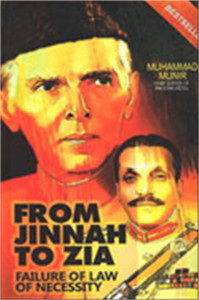
From Jinnah to Zia: Failure of Law
Muhammad Munir
Vanguard, hardback, 2017
Rs995
This book does not claim to be a history of Pakistan. Its less ambitious format is defined as being “a part of that history namely the ideological and geographical changes in Pakistan.”
Muhammad Munir, a former Chief Justice of the Supreme Court of Pakistan, who first articulated and upheld the famous ‘law of necessity’, asks the most relevant question of the time. Was the new Pakistani state a secular or theological one? How have subsequent leaders and regimes visualized the nature of the state and to what consequent? What is the form and content of the ideology of Pakistan? What is the nature of the relationship between certain political parties, like the Jamaat-i-Islami and Islam and Pakistan? How will recent amendments to the 1973 Constitution affect the body politic of this country? How can the resurgence of Islam be placed in the wider context of geo-political changes in the Middle East and the South Asian region?
The author maintains that the Quaid-i-Azam never used the words “ideology of Pakistan” to prove that the pattern of government which the Quaid-i-Azam had in mind was a secular, democratic government.
About the author
Muhammad Munir (1895–1979) was the second Chief Justice of Pakistan serving from 1954 to 1960.
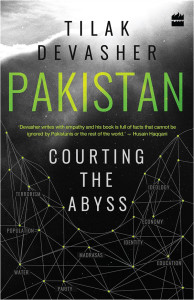
Pakistan: Courting the Abyss
Tilak Devasher
Paperback 2016, Rs1,095
Pakistan expert and commentator Tilak Devasher trains a clear and objective gaze on the deeper malaise that affects the nation, beyond the current crises and the sensationalist headlines. Building on several years of study and work on the region, he examines the looming water crisis, the perilous state of education, the economic meltdown and the danger of an unrealized demographic dividend that have been eating into the innards of Pakistan since its creation. He also dwells at length on the Pakistan movement, where the seeds of many current problems were sown the opportunistic use of religion being the most lethal of these. With data-driven precision, Devasher takes apart the flawed prescriptions and responses of successive governments, especially during military rule, to the many critical challenges the country has encountered over the years. These, as much as the particular trajectory of its creation and growth, he contends, have brought Pakistan to an abyss where it risks multi-organ failure unless things change dramatically in the near future.
About the author
A former bureaucrat, Tilak Devasher writes on developments in South Asia with a focus on Pakistan and Afghanistan. He retired as Special Secretary in the Cabinet Secretariat, Government of India.
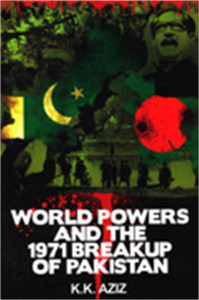
World Powers and the 1971 Breakup of Pakistan
K. K. Aziz
Vanguard, 2016
Paperback, Rs1,295
Most people have a vague idea that in the months leading to the 1971 breakup of Pakistan and during the savage military action in East Pakistan all the major world powers (except China, which couldn’t do anything) were severely critical of Pakistan’s policies and decisions. For the first time, this book chronicles and records this hostility precisely, punctiliously and extensively.
For this purpose Professor Aziz has consulted an incredibly enormous range of source material: 152 newspapers and magazines, 155 journal articles, 133 books, and several unpublished radio and TV broadcast transcripts. The focus is on the United States, the United Kingdom and the USSR, with a brief look at the rest of the world. A detailed chapter describes the making and implications of the lethal Indo-Soviet Treaty. The brief but explosive prologue is a novel and damaging expose of the unpardonable mistakes made by the All India Muslim League leadership between 1906 and 1947 which, irrevocably and inevitably, led to the creation of Bangladesh. This investigation is based on original and contemporary documents. To put the foreign comments in their context, the more relevant portions of the Hamood-ur-Rahman Commission Report are reproduced in an appendix.
This book is a register of events, a narrative of public opinion and an account of how the world powers saw and judged the developments of 1970-71. It is a collection of stark and brutal facts and comments upon them. It is not a work of analysis or judgment because Pakistani scholars are denied the freedom of expression essential for that exercise.
As most of the material used here is available in Pakistan but not all of it at one place anywhere, this volume is a valuable and indispensable source book for any study of the 1971 disaster.
About the author
K. K. Aziz taught poetics, history, Islam and Asian studies for 50 years at various institutions, including Govt. College Lahore, and the Universities of. Manchester, Punjab, London, Khartoum, Heidelberg, Toronto and Cambridge. In Pakistan he served as Deputy official historian to the federal government, chairman of the National Commission on Cultural Research, and Special Policy Advisor to the Prime Minister. In 1997, he was elected to the coveted Aziz Ahmad Memorial lectureship at the University of Toronto. He authored 32 scholarly works.

